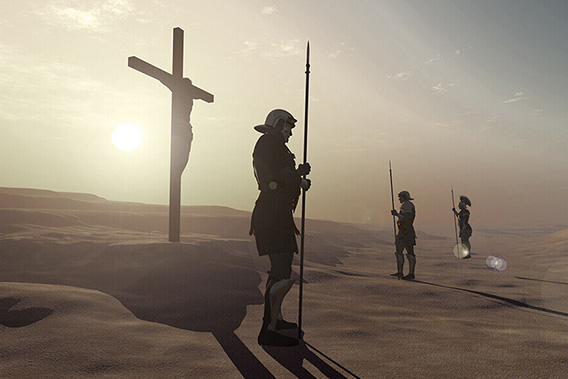“When the centurion and those who were with him, keeping watch over Jesus, saw the earthquake and what took place, they were filled with awe and said, “Truly, this was the Son of God.” – Matthew 27:54
There were many characters who observed the crucifixion of Jesus, many bad, some good. There were mockers, those who scorned Jesus, the Gospel writers reported, those who harangued the Son of God with jeers and angry retorts. There were those who worked for the government, soldiers following orders, very much unconcerned in crucifying an innocent man. They had enthusiastically participated in his torture through scourging, whipping with sharp pieces of metal tied to leather braids meant to ravage the flesh of a human body, and even going beyond, by crafting a crown of woven thorn branches which they savagely forced down on his head. Some of the soldiers cast lots for his clothes.
There was an officer of the soldiers, a centurion, intent on carrying out his death sentence. There were Pharisees and Sadducees, leaders of the Jews, most all sworn enemies of Jesus, yearning for his destruction, standing arrogantly by and surveying with approval the horrific scene of his murder. There were also some disciples, and a few followers, including women friends, and, of course, Jesus’ mother, who all grieved and mourned his pain wracked, fiendish treatment. Finally, there were two thieves, murderers, who were condemned to death on each side.
These all were eye witnesses to his crucifixion. They witnessed the gruesome scene, some with copious tears, and others with evil delight. They observed darkness descend inexplicably in the middle of the day over the three crosses on Golgotha and, indeed, the whole land. Some actually heard the few words Jesus spoke from the cross. They saw him succumb to death before the two thieves’ legs were broken to kill them more quickly. They watched a soldier then thrust a spear into Jesus’ side, causing blood and water to gush out.
It was observed that the centurion and some of the soldiers who witnessed all this come to a sudden realization: the innocence of this man. The centurion, considering the unexplained darkness, and the great earthquake, and all that transpired, burst forth with an exclamation, “Truly, this man was the Son of God!” Obviously dawning on him and even some of the soldiers, they had just crucified the Son of the Living God. Were they terrified? Were they struck with horrified fear? What must have passed through their minds? Was this a realization which would change them permanently? Or would it affect only momentarily? They had had an encounter with the Lord Jesus Christ. Would it be an encounter which would forever change their hearts? Would it lead to transformation? Would they become new creatures? Or would the moment pass leaving them unchanged?
I think of the shepherds in the fields outside Bethlehem on the night of Jesus’ birth. They witnessed angels declaring to them his birth, a heavenly host filling the sky above them, praising the birth of God’s Son, telling them to go and find the babe in a manger, a babe worthy of their worship. They went, and found just as they were told by the angel, and worshipped the babe, and then told everyone they met about all that they had witnessed. This was an encounter with the most remarkable baby ever born, but he did not speak to them, or teach with great authority. He cried and gave the sounds of a new born baby. Did this encounter bring spiritual transformation? Were they dramatically changed by this encounter? Did they become disciples of the King of Kings and Lord of Lords? Did the encounter on this night of nights lead to their eternal transformation? We are not told in the Scriptures any more of these shepherds. We only assume we shall see them in the new heaven and new earth. I believe we will.
We have to wonder this about the centurion and soldiers who acknowledged who Jesus was; He was indeed as they exclaimed, the Son of God. Many of the young men who come to the Paul Anderson Youth Home experience while here an encounter with Jesus. Does this lead to permanent transformation in their lives? Are they genuinely changed? Do they begin an authentic walk with the Lord, a growing relationship, never going back to an unbelieving life? If there is really an encounter with Jesus Christ, does it take hold of their spirit, does God’s Spirit regenerate their soul, abiding in them forever?
If an encounter does not go on to become transformational, it is no different than the encounter Judas had with Jesus and then betrayed him; no different than Demas, who left Paul, “having loved this present world”; no different than the rich young ruler who left Jesus sad, loving his riches more; no different than Cain, or Balaam, or Korah, or Aachen, or Hymenaeus, or Alexander, who rejected the Gospel to be turned over to Satan.
It is always our fervent hope that the young men at the Home have a genuine encounter with Jesus which transforms them, which results in their regeneration, in becoming a new creature in Christ; that they walk with the Lord in newness of life, so that no one can ever pluck them out of their Savior’s hand. An encounter with Jesus should lead to a transformed life, but not every encounter does. It is our prayer that every graduate of this Home will one day stand beside us and hear the words of their Savior and Heavenly Father, “Well done, good and faithful servant, enter into the reward reserved for you.” This is the kind of success we pray for in each of these young men’s lives.
“O to grace how great a debtor daily I’m constrained to be; let that grace now like a fetter, bind my wandering heart to thee. Prone to wander–Lord, I feel it–prone to leave the God I love: here’s my heart, O take and seal it, seal it for thy courts above.”
(3rd verse of Robert Robinson’s hymn, “Come, Thou Fount of Every Blessing,” 1758)
Stay Updated
Sign up for our monthly newsletter and weekly devotional










